Yooka-Laylee (PC) Review
By Tomas Barry  04.04.2017
04.04.2017
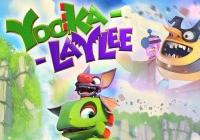
It certainly speaks to gamers' fondness for the N64 platforming era that Yooka-Laylee's initial Kickstarter goal was achieved in just over half an hour. It was also the fastest video game in the website's history to reach one million dollars, indicating a substantial wealth of enthusiasm for Playtonic's proposal to create a spiritual successor to the Banjo-Kazooie series. In this sense, then, the recently established British developer team comprising many former and key members of Rare, has carved out its own means for delivering on their nostalgic, crowd-sourced project. Since the very beginning, then, Yooka-Laylee has been surrounded by a special variety of momentum, sensitivities and pressures.
While many of those unique development aspects are derived from the game's Kickstarter origins, arguably the greater challenge for Playtonic concerns the mantle of responsibility that comes with being a self-confessed spiritual successor. With so many former Rare personnel within their ranks, Playtonic's youthful developers, raised on series such as Donkey Kong Country and Banjo-Kazooie, must feel uniquely linked with the veteran developers who created those games. Folk such as Chris Sutherland and Steve Mayles, as well as many other former Rare employees with key experience in different aspects of development, are all undeniably connected to the late nineties golden era for platformers on the Nintendo 64.
In this sense, Yooka-Laylee seems not only healthily and heartily conceived, but also uniquely situated to carry the spiritual baton. While this still requires a great deal of care and the appropriate sense of responsibility, it's also liberating that they don't have to tiptoe around the issue of its origin and conception, but rather carry on its legacy proudly, with no hiding of that fact. Much in the way Conker's Bad Fur Day had everything in common with Banjo-Kazooie, Yooka-Laylee recycles plenty of characteristics from those franchises in a way that will inherently bind these franchises together in gaming history. This means the game is underpinned by a set of familiar-feeling mechanics, such as a hub world, core and secondary collectables, new moves to unlock that open up previously inaccessible areas, and plenty of character-related tasks and other quirks that hark back to the bird and bear.
The plot sees Yooka the lizard and Laylee the bat trying to stop the hilarious nemesis Capital B, who, along with his company and his henchman Dr Quack, has sucked up all the world's literature and knowledge, planning to harness it for profit. It's up to the dynamic duo to free the 'Pagies' that are locked up across each of the five worlds in order to foil his plan. Across each level, players will encounter a recurring set of characters, as well as level-specific characters and bosses, all of which, quite importantly, make the familiar Banjo-Kazooie-style grunts when they speak.
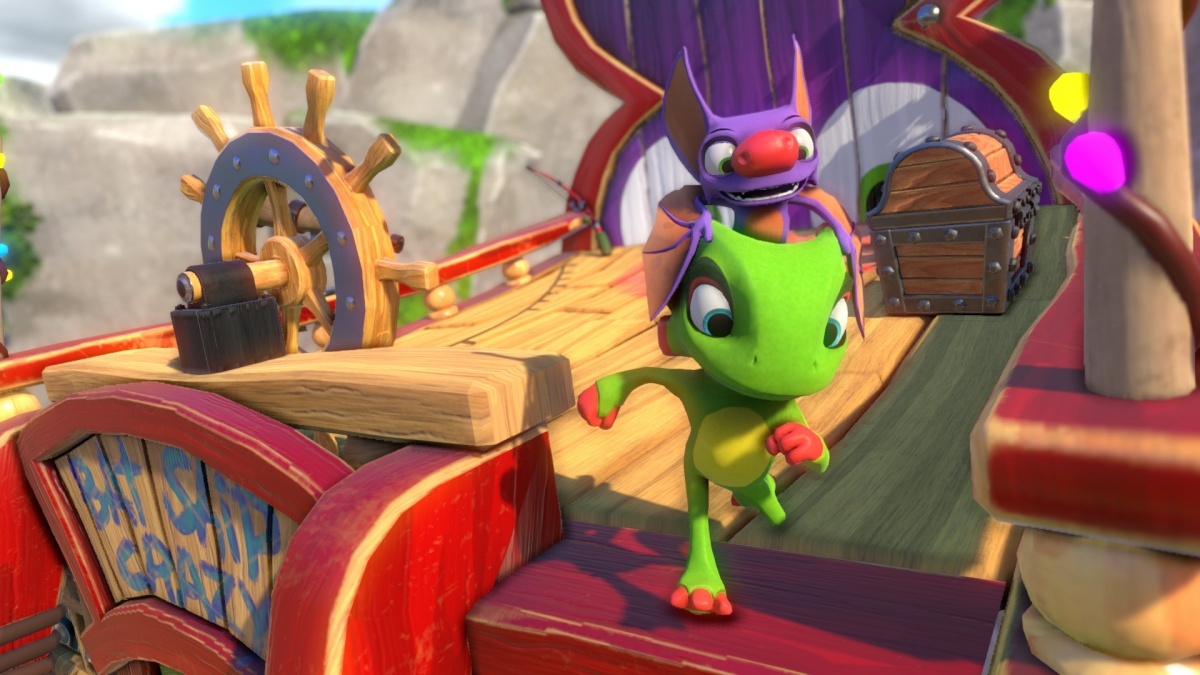
Without a doubt, one of the most charming and powerful elements of Yooka-Laylee is its witty characterisation, which leaves such a nostalgic yet fresh impression today. The range of characters, and the witty, often side-splitting exchanges they have with Yooka and Laylee, really do enrich the charm, fun and soul of the experience. This also highlights a type of soft touch playfulness that, sadly, seems all but lost in games these days. Nothing illustrates this point more fittingly than the genius beheld in Dr Quack's quizzes, which are really mechanically simple additions, but add so much colour and laughter to the overall impression.
In fact, reflecting on the experience overall and its small but significant gameplay quirks, one realises that the timing of this project couldn't have been better. While platformers have enjoyed a particular resurgence in recent times, which this title's Kickstarter certainly helped to strengthen, Yooka-Laylee taps into something very much more specific about the design, the intricacies and the mechanics of platforming games from the Nintendo 64 era. This proves to be a hugely charming and effective aim, resulting in a real appreciation (verging on cognisor levels) for what the game recaptures, particularly since they had free licence to retain the British-brand of humour, slapstick and often meta style of comedy that was such a famous ingredient of Banjo-Kazooie and so synonymous with Rare's style of characterisation.
Take Kartos the Minecart, for example, one of the many characters that pop up in each world. He likes to bicker about the incoherent state of games today and yearns for the good old traditional game experiences. Each minecart mini-game provided by this character, across the breadth of the adventure, presents a significant uptake in skill and ability, never resting on its laurels or being guilty of seeming undeveloped. Since each character's plight leads to such spirited adventure, it's hard to say whether their personality or the actual content is doing more to achieve the magic.
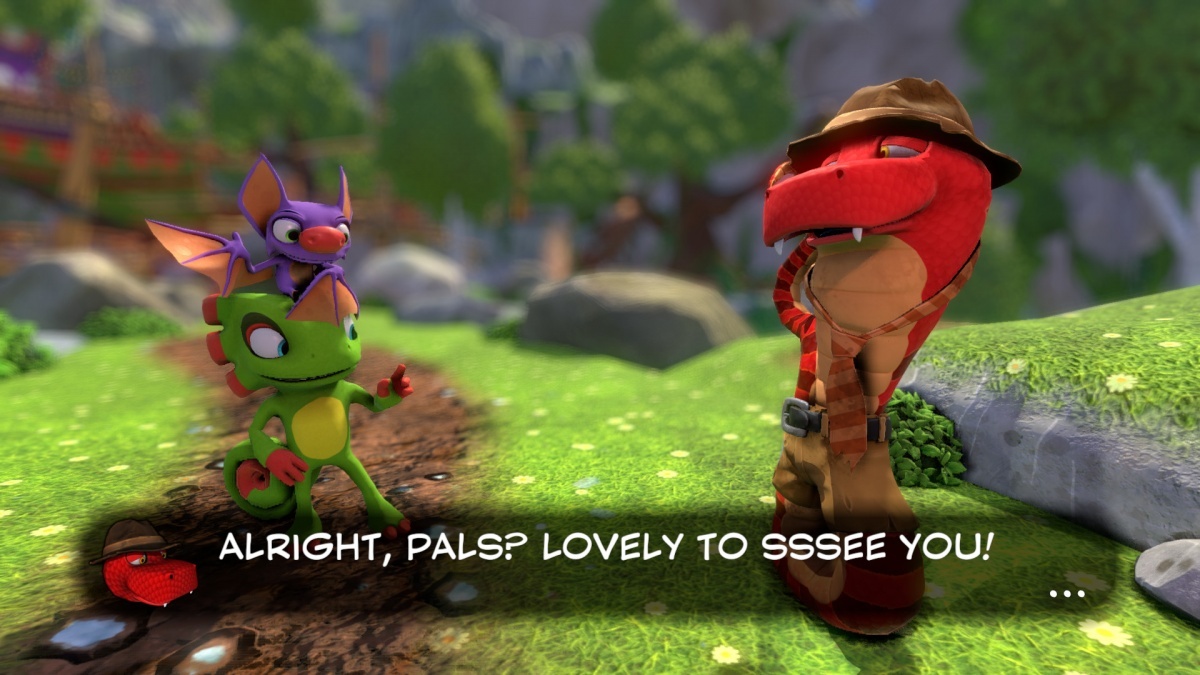
Then, of course, there's the main collectable emphasis itself, with plenty of secondary items beyond Pagies to burn hours hunting down. In lieu of musical notes are quills, which also constitute currency to purchase new moves and game-modifying tonics. Also in that vein, there are 'ghost writers' to locate, play coins to bring to Rextro in order to access arcade mini-games, and various other items to track down.
In this sense, then, Yooka-Laylee doesn't simply present a long list of tasks with plenty of variety, but little depth. Rather, it serves up a series of quite intricate and detailed challenges with particularly retrograde notions of difficulty and creativity. Many of these will be etched into the memory before being solved or beaten, and much like all the other traditional aspects - such as the hub world, the expanded move-set patterns, and the witty and often hilarious secondary characters - the commitment to this philosophy and spirit produces something very distinct and special.
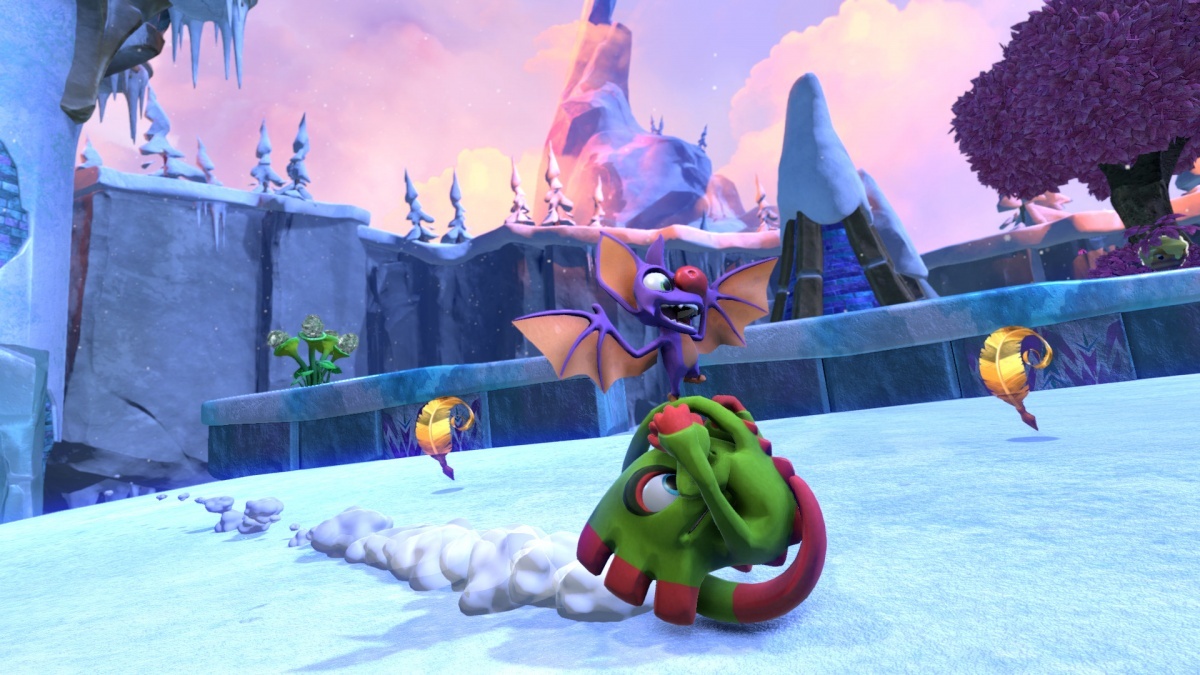
While a contextual understanding of what the experience celebrates certainly enhances it, it's very impressive how all of these microcosmic elements bind together to create such a successful macrocosm. The game's slower explorative and collective emphasis sets a different pace to what gamers are used to from platforming adventure games today, and the sum of its parts will conjure a real appreciation for the design and craft that's gone into it, as well as the platforming era it celebrates and is derived from.
The feeling of triumph when a new move enables access to a new world or to grab that illusive Pagie is a distinct nod to a time long ago, when gaming was different, and exciting in different ways. The cleverness of the progressions earned makes them feel far more valuable than something opened up by a gigantic grind session in some sandbox explorer. Furthermore, Playtonic certainly seems to understand what's gone missing within the genre since those times when the technical ceiling was much lower, which rather dictated creative methodology.
There are five worlds to discover, housed within the hub world setting of Capital B's factory. While the hub world is not exactly the most memorable (with getting lost a possibility, despite shortcuts), each of the five worlds stand out expertly, all with their own design slant and particular sense of aesthetic. For example, the game's first world, called Tribalstack Tropics, is fairly compact, but very dense, with a great deal of verticality owed to its Aztec style temples and ruins protruding up and around. This works in great contrast to, say, Moodymaze Marsh, which is flatter, but spread across a much wider area, with more obscure elements to discover.
So much about Yooka-Laylee, then, just clicks, whether faithfully traditional, re-appropriated in a modern context, or somewhere in-between. One shining example of the latter is the game's orchestral soundtrack, written by former Rare composers David Wise, Steve Burk and Grant Kirkhope. While overall it is more ambient, particularly due to its use of layering and its greater emphasis on textures, rather than winding instantly recognisable melodies, there's still something typically jaunty about the musical content that pulls on the heartstrings in the same way as the fond tunes engrained in the minds of Banjo-Kazooie fans everywhere. One slight slip in this title's overall musical continuity, however, is owed to its having had a different composer working on the music for multiplayer mini-games. This material isn't bad at all; it's just quite out of line with the tone and impression given off by the rest of the music in the main game. However, that's a very minor grievance.
In any case, the inclusion of multiplayer wasn't really necessary, and it's very much a bonus element that Playtonic seems to have thrown in. While it doesn't quite fill a void players didn't know was there in the first place, as Donkey Kong 64's multiplayer mode did, the six head-to-head mini-games available here do inject a great opportunity for laughs with friends. That said, this a component of the game that many players will not touch at all, and they wouldn't necessarily be much worse off for that.
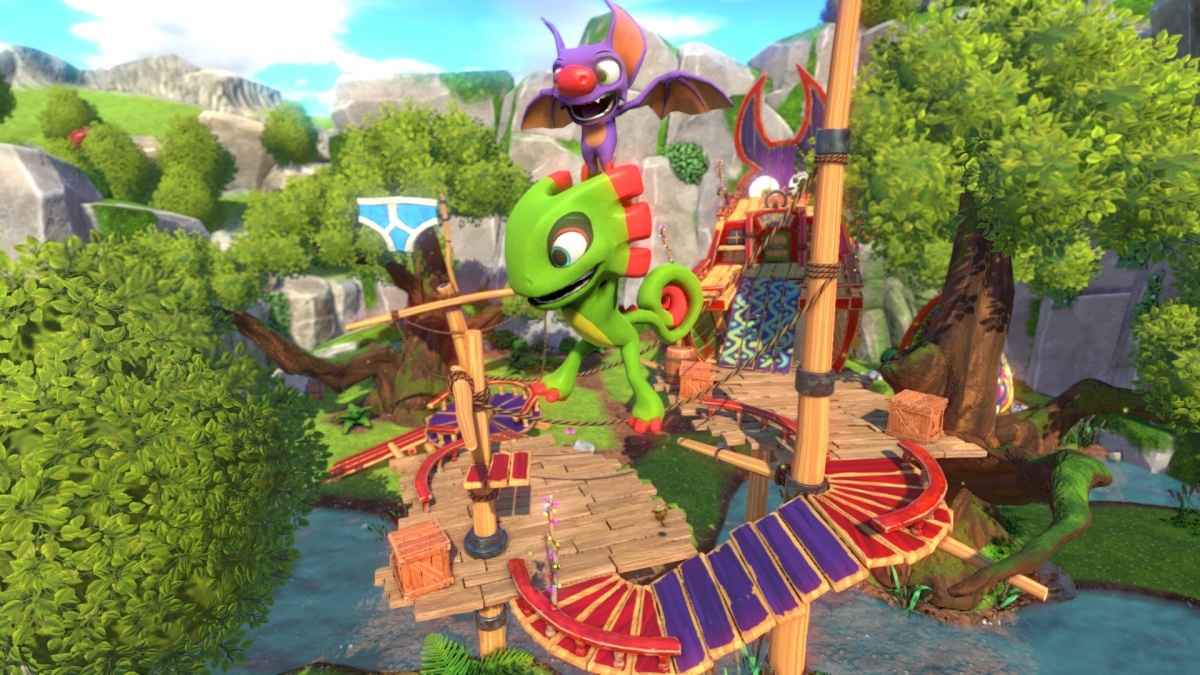
Indeed, Rextro's arcade challenges in the single-player mode probably ended up being the least enticing reoccurring challenge, too. Though this could be at least in part due to their frustrating difficulty, on top of how arduous it is to retry, since you're booted out of the mini-game before being asked if you want another go. The only other significant issue, perhaps a little more noticeable, is the often jittery, unpredictable camera. While this (jokingly) can be viewed as another throwback to the Nintendo 64 days, in reality it's one of the few traits we'd rather go without. Thankfully, this only becomes an issue on a few odd occasions, such as when taking on the boss from Tribalstack Tropics.
From a technical performance standpoint, Yooka-Laylee held a very stable 60 frames per second across the entire adventure, with no noticeable dips in performance or any stuttering. There was a slight graphical glitch issue with water, but this seems to be something that will be patched by launch. On the whole, it seems that the PC version, at least for the moment, is the definitive way to play Yooka-Laylee. It looks absolutely gorgeous, with a simple yet elegant art design that echoes the old graphical style very suitably.
While the game was reviewed on a high-end gaming PC, since it was created with Unity, it certainly stands to reason it'll run with no problems on any reasonably current machine. Should the PC setup be anything less than that, then you're in the unique position where one could argue the stuttering and slowdowns only enhance the sensation of playing on the N64! You can even unlock a 64-bit mode, which is one of the many awesome Easter eggs to be found.
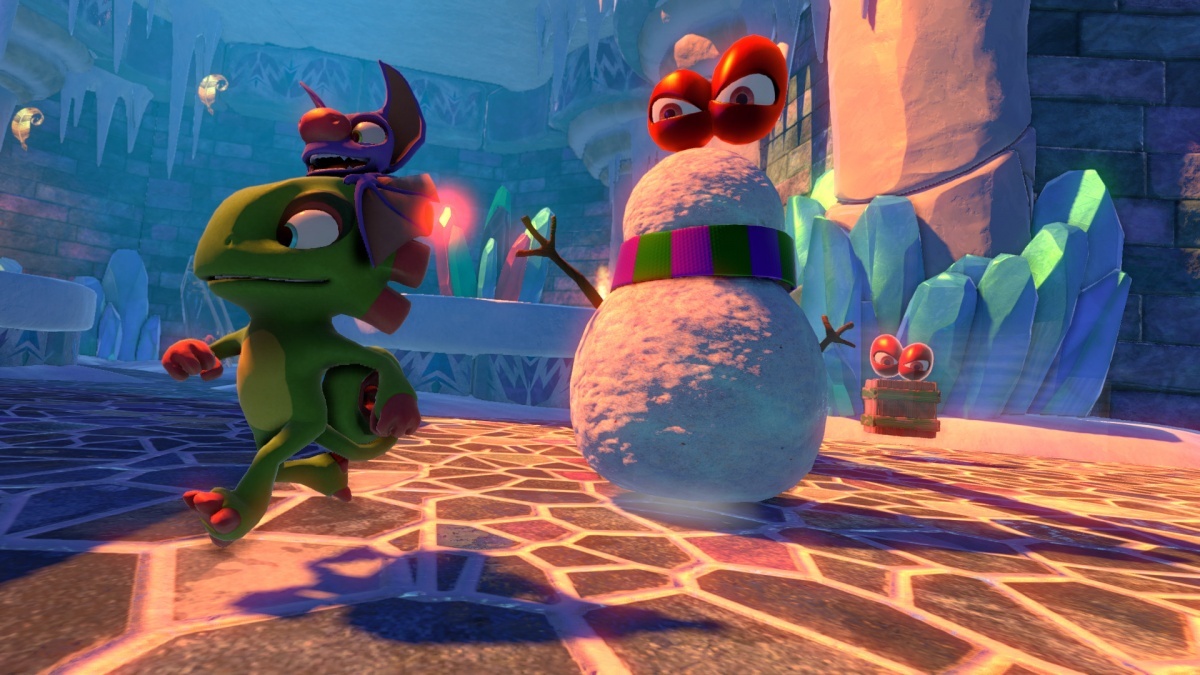
Cubed3 Rating
Exceptional - Gold Award

Reflection upon Yooka-Laylee raises a genuine smile in a way that few video games ever do these days. Undoubtedly, this will sound like the stereotypical ramblings of a Banjo-Kazooie fan drunk on nostalgia; it's true that when Rare slipped into obscurity, setting to work on other types of projects, they left a massive void for this brand of quirky, humorous, collection-heavy platforming adventure. Playtonic has recognised and rectified this, reminding the gaming world that this sub-genre has fallen out of favour for far too long. While it leans on a unique contextual crux, considering the team's history and the Kickstarter origins of the project, the end result is something truly delightful in its own right. A brilliant successor that perfectly channels the creative energies of the N64 platforming era.

![]() 9/10
9/10
![]() 0
(0 Votes)
0
(0 Votes)
 Out now
Out now  Out now
Out now  Out now
Out now  Out now
Out now Comments
Comments are currently disabled

 Sign In
Sign In Game Details
Game Details Subscribe to this topic
Subscribe to this topic Features
Features





 Top
Top

